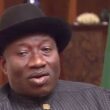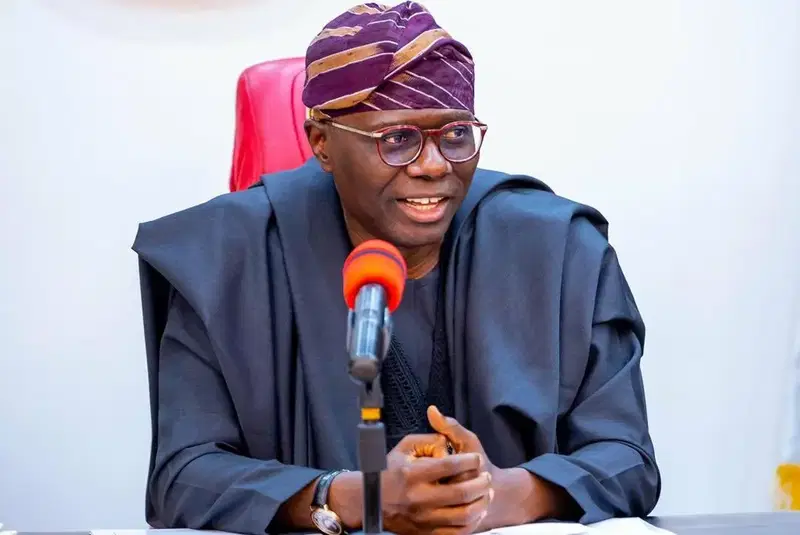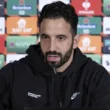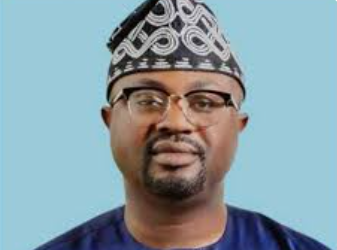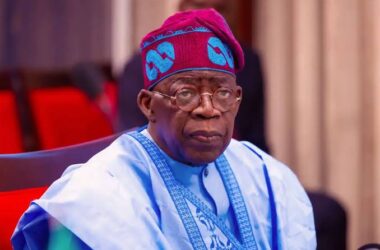Ozurumba Counters Lagos Attorney-General
By Olalekan Adigun
The unfolding legal saga between Governor Babajide Sanwo-Olu and the Economic and Financial Crimes Commission (EFCC) has taken a contentious turn raising suspicion of a last ditch cover up.
Darlington Ozurumba, the lawyer representing Governor Sanwo-Olu in a lawsuit against the anti-graft agency, has openly refuted claims by Lagos State Attorney-General, Lawal Pedro, SAN, who had earlier denied the governor’s involvement in the case. He spoke exclusively to Empowered Newswire in his Abuja office.
The suit, filed before Justice Joyce Abdulmalik of the Federal High Court in Abuja under suit number FHC/ABJ/CS/733/2024, accuses the EFCC of threatening to arrest, detain, and prosecute Sanwo-Olu after his tenure as governor ends. The case has drawn significant public attention, particularly given the constitutional immunity enjoyed by a sitting governor.
Earlier, Attorney-General Lawal Pedro issued a statement distancing Governor Sanwo-Olu from the lawsuit, stating:
“Our attention has been drawn to the news circulating in a section of the media, titled: ‘Sanwo-Olu Sues EFCC over alleged plan to arrest, prosecute him after tenure.
“We wish to clarify that Mr Babajide Sanwo-Olu, at no time, sued or briefed any legal practitioner to file a suit on his behalf concerning the above subject matter. Moreover, it is implausible for the governor, who enjoys immunity as conferred by the Constitution and has almost three years remaining in office, to engage any lawyer on this matter.”
Pedro further emphasized that to his knowledge, the EFCC is neither investigating the governor nor has it threatened his arrest or detention, adding, “We are currently investigating how the case came to be without our knowledge.”
While Pedro’s statement has held sway by and large, the insistence of Ozurumba that it wasn’t Pedro who briefed me and the documented filling he submitted in court tells a different story and openly suggests that there may have been an out of court settlement of the matter soon after the case made the news rounds.
In the exclusive chat with our reporter, Darlington Ozurumba, the governor’s lawyer, directly refuted Pedro’s claims, asserting that he acted on the governor’s explicit instructions.
“We have been barred from talking to the press by the CJN,” the Abuja lawyer started.
But, the persistence of our reporter paid off when he assured Ozurumba that he was not to comment on the substance of the ongoing case rather than address the question of who specifically gave him the authority to institute the suit.
According to him “somebody cannot just file case without instruction. But, there’s no problem. The matter has been taken care of.”
Pressed further on the origin of his brief, he unequivocally stated:
“ I did not file any case for the Lagos State Government. I didn’t represent Lagos State Government which is what the Attorney-General of Lagos State is representing. I filed the case for the governor himself, not Lagos State Government. These are the two things you people [referring to the press] are missing.
” If I file the case for or against the Lagos State Government, there should have been a letter from the government. But, I am not representing Lagos State Government.”
When asked whether the governor himself authorized the lawsuit, Ozurumba directed attention to the court documents, saying, “What did you see on the paper?”
Documents obtained by our reporters corroborate Ozurumba’s assertions. One affidavit, signed on May 29, 2024, by Martha Kanu, Litigation Secretary at Vibrant Chambers, states:
“I am the Litigation Secretary in the law office of Vibrant Chambers engaged by the Plaintiff to institute this action by virtue of which I am conversant with the facts deposed herein.”
Kanu further claimed she had the plaintiff’s consent, recounting that Governor Sanwo-Olu himself informed her of the case’s details during a teleconference held on April 25, 2024.
Her statement reads:
“I was informed by the Plaintiff (Governor Sanwo-Olu) at a tele-conference meeting held in our office at House 45 Savannah Estate, Durumi 2, Abuja on the 25th day of April 2024 at about 2.30pm of the following facts which I verily believe to be true.”
The controversy has sparked widespread speculation, especially as the EFCC’s counter-affidavit, reportedly disputing the claims, has already been published in sections of the press.
Ozurumba lamented this development, criticizing the media for prematurely circulating court documents and potentially prejudicing the case.
Ozurumba’s originating summons raised seven questions and sought 11 prayers.
It sought a declaration that under and by virtue of the provisions of Section 37 of the 1999 Constitution, “the plaintiff, as a citizen of Nigeria, is entitled to right to private and family life as a minimum guarantee encapsulated under the Constitution of the Republic of Nigeria, 1999 before, during and after occupation of public office created by the Constitution.”
The suit also asked the court to declare that based on the community reading of the provisions of Sections 35(1) & (4) and 41(1) of the constitution, the threat of his investigation, arrest and detention by the EFCC during his tenure of office as governor is illegal.
The Lagos Governor in the suit prayed the court to declare that the incessant harassment, threat of arrest and detention, against him upon the EFCC’s instigation by his political adversaries based on false and politically motivated allegation of corruption is a misuse of executive powers and abuse of public office.
Therefore, the suit sought an order restraining the EFCC from harassing, intimidating, arresting, detaining, interrogating or prosecuting him in connection with his tenure as the governor of Lagos State, among others.
The anti-corruption agency opposed the suit in its counter affidavit filed by its lawyer, Hadiza Afegbua, on 31 October, a day the Lagos State Government distanced Sanwo-Olu from the suit.
This correspondent reached out to the anti-graft agency’s spokesperson, Dele Oyewale for his reactions. He, however, declined to comment on the issue saying “Just follow the proceedings in court. I have no comment on that.”


